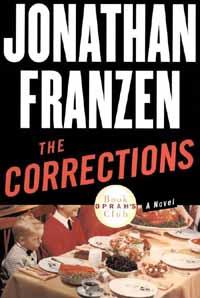That passage appears on page 5 of Jonathan Franzen's The Corrections... and it stayed with me for a while. Why? Franzen is a Prose Artist that takes a thought that most writers would play with for paragraphs and economically states the entire thought in only part of a sentence. On one hand I'm entranced by Franzen's literary economy and his ability to speak volumes with such a small bit of prose. On the other, I'm depressed... I don't write this well, and I can count on my two hands those who can! More entrancing (and more depressing), the great writing isn't localized to Page Five! No, Franzen fills every page with the kind of great art that any literature lover will simply eat up. I found myself having to repeatedly re-read many a paragraph, once for the incredible art of the prose, and again to actually get what's going on... akin to admiring the Frame before the Painiting or eating the Icing, but leaving the cake on the plate.
This is almost a shame, because Franzen isn't simply propping up a poor work with "nifty" words. On the contrary, The Corrections is a fascinating take on the mundane that immediately pulls any reader into the dysfunction of the extended Lambert family. And unlike many a writer (including my own dumb ass), Franzen could never be accused by the Emperor of Austria of having "Too many notes, sir!" Franzen's 567 pages are filled with a surprising budget of words that put together in the right tapestry say what most writers would take pages to write in only a paragraph. It's art, but it's also substantive art, and The Corrections is (to my eyes) the first true classic of the 21st Century.
Like many of you, my only exposure to the novel has been its drafting into and subsequent liberation out of "The Oprah Winfrey Book Club!" Ignore the Hype, ignore the clashes, this is far above any real-world strife!
But Strife is written on virtually every page of the multi-meaning The Corrections! The Lambert Clan is as dysfunctional as a broken calculator, but whose family isn't? As the king and queen of the group, Alfred and Enid Lambert, age into their seventies, Enid becomes more nostalgic and longing, while Alfred becomes more and more senile and confused. It's the three grown Lambert children who are the obvious takers of the slack. If only they could.
Gary, Chip and Denise Lambert are three grown children who have long ago experienced the "straw that broke the camel's back". All three of the broken kids seem to have had no shortage of straws thrown on the old back since then, it would seem. Gary is trapped in a torturous and control-free marriage with three kids who respect him like most of us respect our seat cushions, and is in constant denial of his clinical depression. Chip, a fallen College instructor, is struggling with a screenplay that is equal parts The Paper Chase and BASEketball and bullshitting his way into an international marketing scheme... all the while being in constant denial of his clinical depression. Denise is a professional and semi-famous chef whose sexual exploits and sexual ambiguity have led to a bizarre love triangle that has forced her too to constantly deny her clinical depression.
As we're taken through the densely woven tapestry that makes up all of their lives, we experience many of the same tales of the (oft) mundane from the vastly different view-point of a vastly different character. This almost-Rashomon retelling gives us a deeper understanding of each of our major characters, and, in fact, a deeper understanding of their lack of understanding. Irony is Franzen's tool of black humor here as we find we know more about a character than they seem to know about themselves. And somehow, though we get our hints throughout, Franzen maintains this tool as a surprising element up until the very end of this slice of life.
But at no time is this novel ever predictable. While The Corrections deals openly and fascinatingly with the mundane, this is anything but ordinary. The mundane and simple is often balanced by the surprising, and though there's almost no action in this novel, there are some definitive shocks. Even Enid's search for the perfect  Norman Rockwell Christmas (as if this ever existed) has a tendency to say more about her self than the Christmas she strives for.
Norman Rockwell Christmas (as if this ever existed) has a tendency to say more about her self than the Christmas she strives for.
That said, there is a great capture of the cyclical nature of lineages. Try as we might it's hard for many of us to avoid the very most difficult aspects of our parents arising in ourselves. And this is never better displayed in the efforts of the Lambert offspring to spring off into their own. The more they deny their depression, the more they're condemned to repeat the mistakes of Alfred and Enid. And it's all told in some of the most amazing prose you could hope to find.
Franzen does have a tendency to over-act in his writing, comfortably throwing melodrama and over-the-top dialogue into the beauty of his writing, possibly throwing off the rhythm of an overall great work. At first I was a bit put off by this, however, the key to his near-farcical (only at times) writing is right there in the novel. Franzen buries his admission of intent in the story so deeply you might miss it. However, in that Franzen challenges his reader to get deep with him, to look past the frame and into the brush-strokes, it's not hard to understand what Franzen is really writing. By that token this is no minor detractor to The Corrections but a major asset. The key is in there like Prego!
Sometimes a work can appeal to the masses on a commercial scale, and sometimes a work appeals to the Literati. Rarely do these cross paths. The Corrections, a title that means a great many things, is one of those rare cross-overs. Interestingly enough, the Literati, though seduced by the scale of Franzen's writing, didn't want to be associated with the pretentious masses that made the novel a best-seller. Many could be seen reading the novel on the subway with the cover ripped off. Feel free to follow suit. The Corrections is not to be missed, even if, to enjoy it, you have to define yet another meaning to the title.
Five Stars out of Five for Jonathan Franzen's The Corrections. While a slice-of-life, there is a definite plot to the novel (which I wouldn't dare spoil), and an amazing one it is, mostly because of Franzen's colorful prose style! As for the family dysfunction, pain, and oddly enough, love, this is the best novel of its kind since Guest's Ordinary People! It's also the first great, great novel of the new millennium! (But then, since the millennium was only 1.5 years old when this novel came out, we've got time for more greatness. Franzen, get to typing!)

